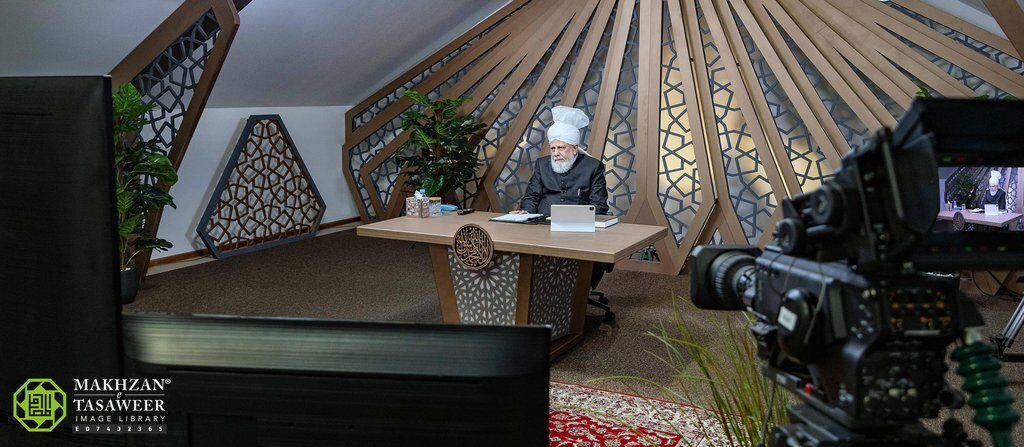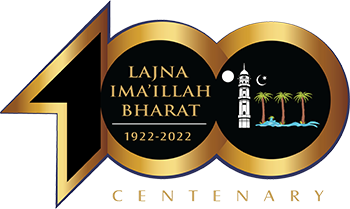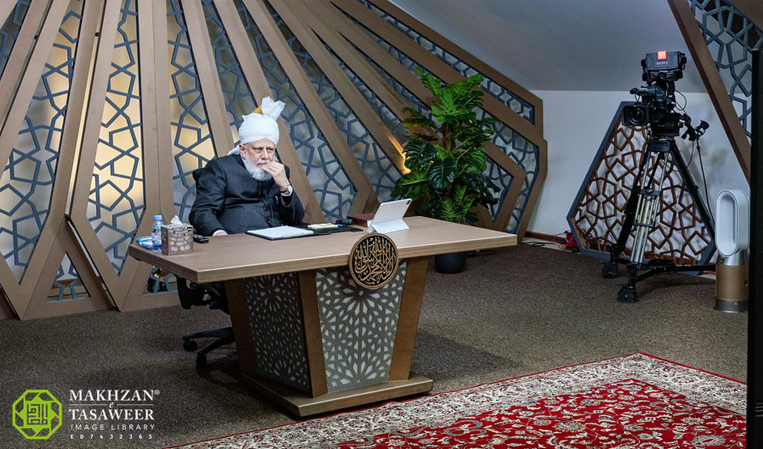On Sunday, 8 January 2023, a group of students from Lajna Imaillah India were blessed with the opportunity of meeting Hazrat Mirza Masroor Ahmad, Khalifatul Masih V, may Allah be his Helper, in a virtual mulaqat.
After conveying salaam, Hazrat Amirul Momineenaa called upon Ghazala Naeem Sahiba to recite a portion of the Holy Quran, followed by its Urdu translation. An Urdu poem was then presented by Khaula Tanveer Sahiba.
Aqeela Ghori Sahiba, Secretary Umur-e-Talibat Lajna Imaillah India, then presented a brief report in which, after conveying her salaam to Huzooraa, she stated that, under the guidance of Hazrat Khalifatul Masih Vaa, female Ahmadi students of India have made great and exceptional progress in their education and various fields of study.
She further said that, after attaining education, Ahmadi women are not only becoming a great asset to society, they are also proving useful in their service for the Jamaat. She said that, presently, there are 262 Ahmadi women students in Qadian studying in various fields. Out of the 262 students, 68 are in the blessed scheme of Waqf-e-Nau. She then requested Huzooraa to pray that Ahmadi women may excel in piety and righteousness and be of great service to the Jamaat.
Aneeqa Bajwa Sahiba, who is pursuing a PhD in life sciences, had the opportunity to deliver a presentation and her research on mechanistic studies on the chemopreventive potential of Murraya koenigii leaf extract against chemically induced skin carcinogenesis in mice. That is, she explained how a certain plant extract may help prevent skin cancer in mice that were exposed to chemicals.
After the presentation, Hazrat Khalifatul Masih Vaa asked her if this is still in its experimental stage, to which she replied in the affirmative. Huzooraa advised her not to be content with lab-based research but also gather data and look into the real-life impact of its application in the field.
Hazrat Amirul Momineenaa asked how many students are seated in the hall, to which Huzooraa was told that there are 170 students. Thereafter, this fortunate group of Lajna students had the opportunity to ask Huzooraa various questions on issues they faced and the Islamic perspective on various matters.
Shumaila Mehwish Sahiba, a student of year 12, asked if it is permissible for Ahmadi Muslim women to pursue a career in law, the civil service, navy, or the army.
Huzooraa said:
“You may pursue law; it is beneficial. It is better if one pursues a field in human rights.” However, Huzooraa added, girls should not pursue criminal law as this may lead to some issues. One may pursue the civil services; however, there, one will have to take care of their attire, purdah, and modest dress. It should not be that one is posted in such areas where one is told that it is forbidden to wear a niqab or a burqa.
With regards to the question about armed forces, Huzooraa said, this field is not suitable for girls under the current circumstances.
Adeela Majid Sahiba, a student of dental surgery, said there is a lot of opposition against the hijab in India. Muslim girls are told to remove their hijab as they enter exam halls.
Hearing this, Huzooraa asked, “Is this in every province or in a particular area? Is this a decision of the local administrations or is it from the government?” To this, Adeela Majid replied that it is at the discretion of the body conducting the exams.
She further said that recently, a female student was stopped from taking her medical exam because she refused to remove her hijab. She asked whether an Ahmadi girl faced with such a situation should remove her hijab?
Hazrat Amirul Momineenaa said:
“If one’s head is covered, and the face was bare, then no one could stop you. If you cover your head and place your veil just below your chin, I do not think anyone would stop you. If even then, someone stops you, you should still take care of your modesty and the clothes; and take legal action against them to determine why you were stopped. Nazarat-e-Talim should also try to resolve this matter by writing to their administration, and then one can also take legal action, the student should too.
“Firstly, what is the extent of the restriction? One restriction could be to remove the veil completely and bare the head; such a restriction is imposed nowhere. In Indian society, there are Hindu and Sikh women who cover their heads. So, to what extent are you prohibited? This must be defined first. If you are told to bare your face only, then there is no problem; one may then take the exam with one’s face bare while the head is covered with a scarf, and also wear a coat.”
Adeela Sahiba said that some education centres have told Muslim girls to even take their scarves off.
Hearing this, Huzooraa said:
“Then a report should be filed against them. […] Is one allowed to wear a dupatta? Even Hindus wear a dupatta.” The questioner answered in the affirmative.
Hazrat Amirul Momineenaa explained:
“If one wears a coat, loose and modest clothes, and covers their head with a dupatta, then nobody can object, as Hindus and Sikhs all do the same. And, in this way, one can wear a dupatta and take their exam.”
Huzooraa said, in addition to this, one should also peacefully fight one’s case while staying within the limits of the law and raise the question as to why such discrimination occurred. Otherwise, in the future, they may also start discriminating against others such as Sikhs for wearing turbans etc. Huzooraa said that one should raise their voice against such discrimination by writing to newspapers.
Huzooraa added that one should ask themselves whether they want to give precedence to faith over the world by acting upon the hadith الْحَيَاءُ مِنَ الإِيمَانِ i.e. ‘Modesty is part of faith.’ (Sahih Muslim, Kitab al-Iman, Hadith 36) or compromise the faith for the sake of the world instead.
Huzooraa also said that during the coronavirus pandemic people used to wear masks. Even then, people’s faces were hidden. If masks were allowed, then why the restriction against purdah?
In the end, Huzooraa said that in any case, wearing at least a dupatta is compulsory even under such circumstances, and if one is not allowed to take the exam with it, then they should leave the exam and take legal action.
Uzma Muneer Sahiba, who serves in the department of homoeopathy at the Noor Hospital and is also a first-year student of MD homoeopathy, asked Huzooraa to what extent it is permissible for an Ahmadi woman to take pictures while wearing a veil. She said that on many occasions such as professional events, some Ahmadi women are asked by non-Ahmadis or non-Muslims why they do not want to be included in group photos even while observing purdah.
She asked Huzooraa what one should do in such a situation.
Hazrat Khalifatul Masih Vaa said:
“If one is part of a group photo while they are observing purdah, and their head is also covered; and according to the commandment of the Holy Quran, their body is also fully covered – whether it is covered with a coat or a chador – then, if a [group] photo is taken, it is not a problem. However, if one’s face is bare, the head is also bare, and the dress is not modest, then it is wrong.”
Uzma Muneer Sahiba further requested Huzooraa if she can ask another question. Upon being given permission, she said that when calamities and wars occur, in which many innocent people are killed, people ask where God is. She added that even in her medical profession, some patients, who are disabled, ask where God is.
Hazrat Amirul Momineenaa answered that Allah’s law of nature is always in action. Allah has not stated anywhere that if people go against His laws of nature, He will still save them. Wars occur, bombs explode, and innocent and young children also die as a result. Wars are the result of human wrongdoing. With every action, there is a reaction. Hence, there are wars and there are losses as a result of them. If someone says that he will start a war but avoid its losses, then that is impossible.

As for the question of why some children are born disabled, it is, Huzooraa said, due to human weaknesses because of which some children are born disabled. Huzooraa said that she could research this and see. However, God does not place the same burden of the sharia on such children and recompenses them in the Hereafter.
Hazrat Amirul Momineenaa said that Hazrat Musleh-e-Maud’sra books, Ten Proofs for the Existence of God and Hasti-e-Bari Ta‘ala deal with this issue and encouraged the questioner to read these two books for a detailed answer to her question.
Hania Sehrish Sahiba, a student of computer science, asked how one could relate and connect the latest innovations in computer science, such as artificial intelligence and data analytics, to the teachings of the Holy Quran. She further asked how one could gain Allah’s blessings after learning and using these technologies.
Hazrat Amirul Momineenaa answered:
“Allah Almighty said that any invention which did not interfere with the law of Allah was permissible and one was allowed to take benefit from it.” However, the Holy Quran specifically prohibited the alteration of God’s creation by way of cloning for example. Huzooraa added, “The Holy Quran says that whatever is beneficial for mankind, is permissible to do. […]”
Hazrat Amirul Momineenaa then said that when a believer gains any achievement in their research, they attribute their success to the blessings of Allah, whereas an atheist who also works hard, and sees the same achievements, will attribute their success to their intellect and knowledge. Huzooraa explained that both achieve the same result, however, the believer, who achieves success by following the teachings of the Holy Quran, will attain both worldly success and that of the Hereafter because they thank Allah and attribute their achievements to Him and His blessings.
Sadia Hameed Sahiba asked Hazrat Amirul Momineenaa that during online teaching, where the teacher is required to teach via webcam, some students record the screen and upload it to YouTube. She asked Huzooraa how an Ahmadi Muslim teacher should take care of her purdah in such a situation.
Huzooraa said that if one is teaching while observing the hijab, and one’s forehead to the chin is bare, then there is no issue with teaching in such a hijab. If a student records the class, Huzooraa said, and uploads it online for the benefit of other students then there is no problem with it. However, Huzooraa said that one should not take this to mean that as one’s face is bare, one could forgo the commandment of purdah altogether, this is wrong. Huzooraa added that this does not mean that one could start uploading their photos on social media.
Huzooraa then conveyed his salaam and the meeting came to a successful conclusion.
(Report prepared by Al Hakam)

